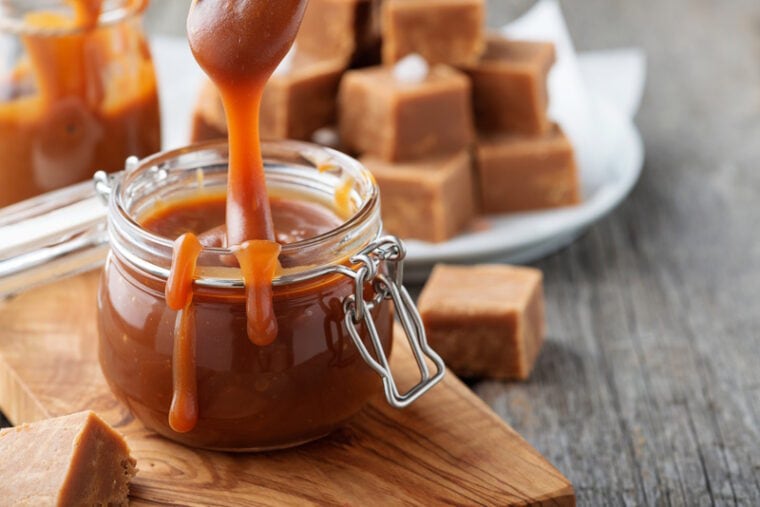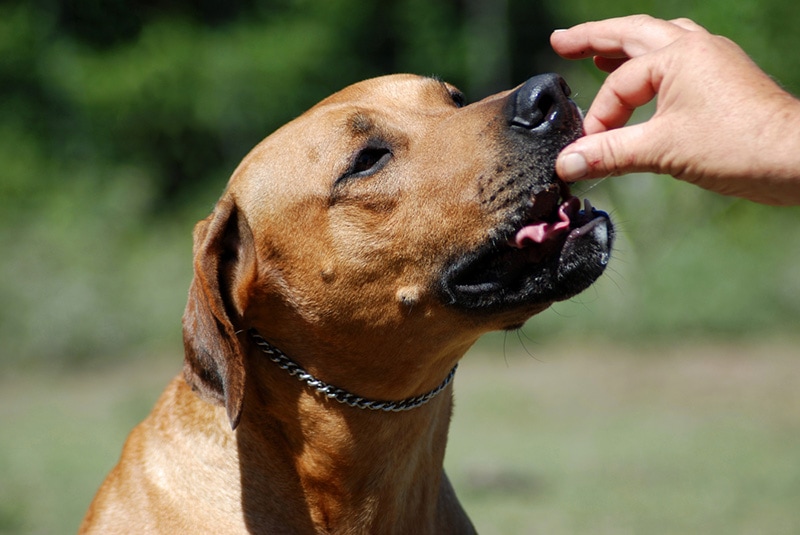
Click to Skip Ahead
Caramel is a sweet candy that has been around for a long time; some believe the first forms of caramel originated around 1000 AD! The sugary confection is commonly enjoyed drizzled over desserts or eaten as a hard candy, but can our dogs enjoy it with us? Considering caramel is made almost entirely out of sugar, dogs really shouldn’t eat caramel. Excessive sugar is bad for dogs, and even one bite of caramel could lead to some gastrointestinal problems.
Why Is Caramel Bad for Dogs?
Caramel isn’t toxic to dogs (unless it contains ingredients like xylitol), but it’s not a healthy treat to give them. Caramel is usually made of mostly sugar but can also contain butter, condensed milk, and other unnecessary ingredients. All these combined make for an incredibly sweet treat, which can cause problems for your pup, even if they only eat a small amount.
Large amounts of sugar all at once can affect a dog’s gastrointestinal system, whereas large amounts of sugar more regularly will lead to weight gain and the problems associated with being overweight. Gastrointestinal signs that you might see after feeding your dog a highly sugary snack such as caramel include:
Many caramel recipes also contain large amounts of butter which is almost entirely made up of fat. If fat is eaten in large amounts, not only can it lead to problems associated with obesity, but it can also lead to a painful condition known as pancreatitis. Pancreatitis is the inflammation of the pancreas and is often associated with a high fat diet in dogs. Signs of pancreatitis are lack of appetite, vomiting, a painful abdomen and lethargy. It is very important to take your dog to the vet if you notice these signs.

The Dangers of Chocolate and Xylitol
Another danger of caramel is that some brands might contain toxic ingredients. Store-bought “sugar-free” caramel candies commonly contain xylitol, which is a sugar substitute that’s incredibly toxic to dogs. Doses as low as 34 milligrams (mg) per pound of body weight 1 can cause hypoglycemia (low blood sugar), where higher doses of greater than 227 mg/lb can cause liver toxicity and death 2.
Chocolate is another food toxic to dogs that’s commonly combined with caramel. Chocolate contains theobromine, which stimulates the central nervous system and can cause potentially life-threatening heart arrhythmias (incorrect rhythm) and central nervous system dysfunction. Dogs are much more sensitive to theobromine than humans, because they can’t break down and excrete the theobromine very well, meaning that this toxin builds up in the bloodstream. This makes dogs much more sensitive to chocolate toxicity than humans. While chocolate is rarely fatal to dogs, it’s important not to let your dog have any, and to call your vet if you think your dog has had some chocolate.

What Should I Do If My Dog Eats Caramel?
If your dog eats caramel, it’s essential to determine whether it has any toxic ingredients. If the caramel was store-bought, it’s more likely to have xylitol if labeled “sugar-free.” If the caramel contains chocolate or xylitol, head to the vet as soon as possible. Bring any packaging you can with you when you take your dog, as your vet may need to use it to decide on the best course of treatment for your pup.
If the caramel is homemade or doesn’t contain anything toxic, it’s best to call your vet and ask for advice. They might advise you to bring your dog in for an assessment (mainly if they ate a lot), or they could say to monitor your dog for any signs of illness at home.
If your dog suffers from any health conditions such as diabetes, you must seek advice from your vet; excessive amounts of sugar can worsen some health conditions and the fat content of caramel can lead to pancreatitis.

Frequently Asked Questions
Is Any Caramel Safe for Dogs to Eat?
Unfortunately, no type of caramel is safe for dogs to eat. Sugar is always unhealthy for dogs, and caramel is almost always packed full of it. Sugar-free caramel is also dangerous to give to your dog. Your dog may be okay after eating a small amount of caramel (as long as it has no toxic ingredients), but it’s not recommended to give it to them.
What Are Some Healthy Alternatives to Caramel?
While your dog would enjoy caramel because it’s so sweet, many healthier alternatives still give them a sweet treat. Fruits such as blueberries and strawberries are very sweet and offer a healthy boost of vitamins and antioxidants that are much more beneficial for your dog.
An even better way to provide a dose of sweetness is by offering your pup a sweet vegetable, such as green beans or carrots; they’re lower in sugar but still naturally sweet and satisfying!

Final Thoughts
Caramel isn’t toxic for dogs, but it’s harmful due to the amount of sugar it contains. The large amount of sugar in caramel can give your dog gastrointestinal problems, even if only a small amount is eaten. The amount of fat and calories in caramel can also cause serious problems, so it’s important never to feed it to your dog. Caramel is often combined with toxic ingredients such as chocolate and xylitol, as well as being high in fat, so make sure you keep all caramel and caramel confections well out of your dog’s reach!
Featured Image Credit: nelea33, Shutterstock







